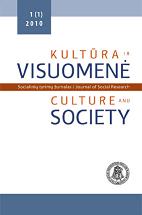Psychiatry and the Mental Patient: An Uneasy Relationship
Psychiatry and the Mental Patient: An Uneasy Relationship
Author(s): Giedrė BaltrušaitytėSubject(s): Cultural Essay, Political Essay, Societal Essay
Published by: Vytauto Didžiojo Universitetas
Keywords: psychiatry; mental illness; mental patient; paternalism; empowerment; psichiatrija; psichikos liga; psichikos liga sergantis pacientas; paternalizmas; įgalinimas
Summary/Abstract: The second half of the 20th century has witnessed major changes in the way mental health care in the Western countries has been organized and provided for people suffering from mental illness. Deinstitutionalization and community care became common terms used to define a policy that aims to shift the locus of psychiatric care from large mental hospitals and custodial institutions into community. The aim of this article is to examine psychiatric conception of mental illness, treatment and the psychiatric encounter. The presentation largely draws upon analysis of Lithuanian psychiatric texts, although some foreign psychiatric literature is also used. The article starts with an introduction of a changing situation of the mental patient and proceeds to the analysis of the psychiatric discourse. The author argues that by conceptualizing mental illness as pathology located within the functioning of the individual body that affects the ability of a sick individual to apprehend the reality and to retain critical insight towards one’s health problem, psychiatric discourse may reproduce paternalistic approach towards the mentally ill individuals even in the deinstitutionalized settings. Such an approach may have certain implications for the individuals’ ability to lead an independent life in the community. XXa. viduryje prasidėjęs deinstitucionalizacijos bei bendruomeninio pobūdžio psichikos sveikatos priežiūros paslaugų plėtros procesas pareikalavo naujo – įgalinančio – požiūrio į psichikos liga sergantį žmogų ir jo galimybes savarankiškai gyventi bendruomenėje. Straipsnyje keliama prielaida, kad psichikos liga sergantis žmogus ir toliau yra traktuojamas kaip nesugebantis suvokti ir apibrėžti savo poreikių bei interesų. Toks požiūris į psichikos sutrikimus turintį žmogų iš dalies yra sąlygojamas ir palaikomas profesinio psichikos ligos diskurso bei praktikų. Psichiatrinėje literatūroje vyrauja (bio) medicininė psichikos ligos ir jos gydymo samprata, prioretizuojamas medikamentinis gydymas. Šioje sampratoje liga yra lokalizuojama individe ir tokiu būdu tampa jo elgsenos ir asmenybės vertinimo kriterijumi. Psichikos liga yra apibrėžiama kaip sąlygojanti sergančiojo realybės suvokimo jausmo praradimą, nesugebėjimą kritiškai įvertinti savo situacijos. Tai tampa pagrindu patologizuoti sergančiojo elgseną: pacientas laikomas nepatikimu, linkusiu manipuliuoti gydytoju, todėl paciento elgsena turi būti nuolat stebima ir kontroliuojama. Tokiu būdu yra pateisinamas paternalistinis požiūris į pacientą. Paternalistinio santykio įsišaknijimas psichiatrinėje priežiūroje sąlygoja psichikos liga sergančio žmogaus priklausomybę nuo sveikatos priežiūros sistemos ir tokiu būdu gali neigiamai įtakoti jo galimybes aktyviau ir savarankiškiau spręsti gydymo ir gyvenimo problemas.
Journal: Kultūra ir visuomenė: socialinių tyrimų žurnalas
- Issue Year: I/2010
- Issue No: 1
- Page Range: 9-27
- Page Count: 19
- Language: English

